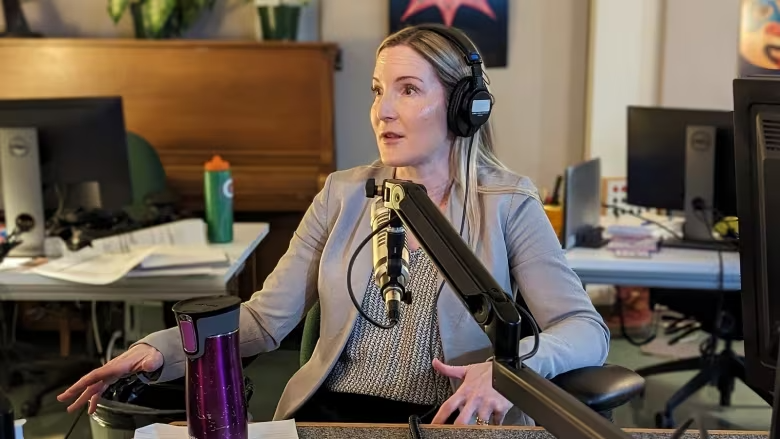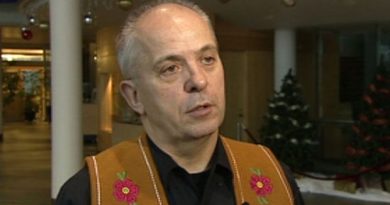Yukon RCMP is monitoring potential foreign interference. What does that look like?

Suspect investments into mines extracting critical minerals could be of central focus
Yukon RCMP say the territory is vulnerable to foreign interference, and police are closely monitoring for any signs of threat from abroad.
Supt. Lindsay Ellis told CBC News the RCMP’s monitoring of foreign interests are manifold, including investments in major infrastructure, road and bridge projects, the dissemination of information, and intellectual property (copyright, trade secrets, etc.).
That’s all in an effort, Ellis said, to suss out bad actors and hold the accountable to the laws of the land.
“We would be looking at what foreign interest may be a detriment to the economic integrity of Canada, to the safety of Canadians and the national security,” she said.
Ellis wouldn’t confirm whether there are active investigations in the Yukon. Still, she said the territory is vulnerable.
“The Yukon has the largest land border with the United States that’s unmanned. It’s vast, it’s huge … Is that a challenge? Yes.”
Foreign interference, by definition, is broad, including things like espionage, cyber warfare, distorted news and investments that are suspect. Ellis said it can be overt and local — for instance, hackers fleecing First Nations elders of their money — or discreet, with global ramifications.
What appears to be driving debate in the country, specifically, is how the global race for the critical minerals needed for renewable energy projects could be attracting politically-charged investments that could affect Arctic and, from there, national security.
‘Any company is at risk’
The International Energy Agency says demand for critical minerals in the energy sector could increase sixfold by 2040, compared to 2020.
Affected by that demand is the Yukon, which is seeing more exploration for critical minerals. Of the 31 critical minerals listed by the federal government, only six had yet to be documented in the territory by 2022. Those include aluminum, helium and potash.
The market for critical minerals now measures in the hundreds of billions of dollars.
Huge money and, as one expert says, huge risk.
Aurel Braun, a professor of international relations and political science at the University of Toronto, said no jurisdiction, including the Yukon, is immune from the wrong kind of investment.
The context — Russia has long wanted to dominate the Arctic, claiming larger portions of the region, actions it’s been doubling down on as the planet warms at an accelerated pace. China, wedging itself into affairs in the circumpolar North, now calls itself a “near-Arctic state.”
Braun said it doesn’t matter if Canada has sanctions against Russia, shell companies can — and will — circumvent them.
“It would be in their interest to buy, coerce, manipulate any such companies because what they want is energy,” he said. “If a company is able to produce rare earth materials or strategic minerals, if [they’re] able to produce energy, then they will undoubtedly be monitored, possibly approached by Russia and China.
“Any company is vulnerable to corrupt actors, and they have to build up defences and they have to understand what is at stake and they have to work with their respective governments.”
What that corruption looks like could take the form of investment fraud or cryptocurrency scams.
Late last year, a Chinese company purchased a nearly 10 per cent stake in a mine near Yellowknife and all of its stockpiled rare earth material. The federal government says it’s reviewing the transaction. So far there’s no indication of any wrongdoing.
What are the defences?
Yukon MP Brendan Hanley said the federal government is working to vet more thoroughly investments that could have a shady bent.
Still, he said investments from other places are much needed.
They also need more scrutiny, Hanley said.
“They will be monitored and they will be denied if they pose a threat to Canada’s security,” Hanley said.
But how?
The federal government has a policy on foreign investments from state-owned companies.
The policy states there are “inherent risks” in those.
Accordingly, it states foreign investments will only be accepted on an “exceptional basis” and after minister approval.
The policy falls under the Investment Canada Act, now before the Senate, and is in the process of being amended.
If it is, the act would allow more scrutiny of certain investments because they would be booted over to a national security committee for analysis.
Yukon Senator Pat Duncan is on that committee, and she said the timing is right — investments in critical minerals are booming.
What is the territory planning?
Last week, the territorial government announced that it’s assembled a team of experts to head its new Arctic Security Advisory Council.
Chair Ken Coates recently said a central focus of the council is how foreign entities are after critical minerals.
Truth will tell in six months, when the advisory council finishes its work.
Related stories from around the North:
Canada: Potential Canadian Northern Corridor would present unique security challenges and opportunities, say researchers, Eye on the Arctic
China: Satellite imagery reveals construction progress on new Chinese Antarctic base, Eye on the Arctic
Denmark: Danish policy prioritizes low-conflict Arctic amidst Russian tensions, Eye on the Arctic
Iceland: Nordics should aim for common approach to China’s Arctic involvement says report, Eye on the Arctic
Norway: Svalbard’s travails in a changing Arctic, Blog by Marc Lanteigne
Russia: National security chief says Russia must bolster its Arctic military, The Independent Barents Observer
United Kingdom: Russia’s growing dependence on China altering dynamics in Arctic, UK committee hears, Eye on the Arctic
United States: Russian, Chinese vessels near Alaska reminder of ‘new era of aggression’: Senators, Eye on the Arctic



